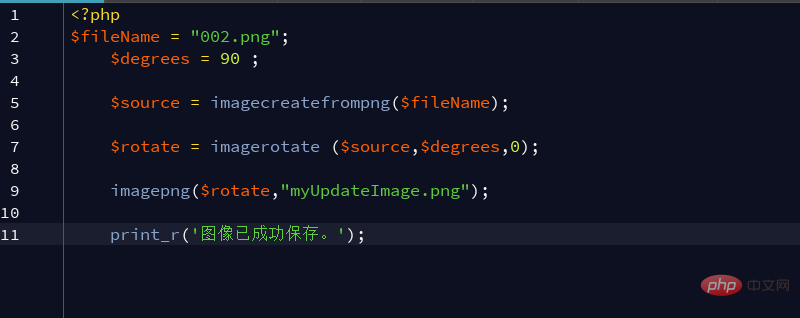
How to rotate and save an image in PHP: First use the function [imagerotate()] to rotate the image at a given angle; then use the function [imagejpeg()] to output the image to a browser or file, the code is [imagejpeg (resource $image)].

[Related learning recommendations: php programming (video)]
In PHP Methods to Rotate and Save Image:
If you want to upload a 90 degree or 180 degree rotated image in PHP, then this tutorial will help you. We will use the imagecreatefrompng(), imagerotate() and imagepng() functions to rotate png images and save them to the server. The same goes for jpeg images.

In the following code example, we will introduce to you how to rotate the specified image 90 degrees in PHP, save it, and rename it to "myUpdateImage.png", "myUpdateImage. jpeg" implementation method.
png examples are as follows:
<?php
$fileName = "002.png";
$degrees = 90 ;
$source = imagecreatefrompng($fileName);
$rotate = imagerotate ($source,$degrees,0);
imagepng($rotate,"myUpdateImage.png");
print_r('图像已成功保存。');jpeg examples are as follows:
<?php
$fileName = "001.jpeg";
$degrees = 90;
$source = imagecreatefromjpeg($fileName);
$rotate = imagerotate($source, $degrees, 0);
imagejpeg($rotate, "myUpdateImage.jpeg");
print_r('图像已成功保存。');
?>Function introduction:
imagecreatefrompng()Function creates a new image from a file or URL.
imagecreatefrompng ( string $filename ) : resource
imagecreatefrompng()Returns an image identifier representing the image obtained from the given file name.
The parameter filename represents the path of the PNG image. Return value, image resource is returned after success, FALSE is returned after failure.
1. The imagerotate() function rotates the image with a given angle.
imagerotate ( resource $image , float $angle , int $bgd_color [, int $ignore_transparent = 0 ] ) : resource
Rotates the image with a given angle. bgd_color specifies the color of the parts that are not covered after rotation.
The center of rotation is the center of the image, and the rotated image will be scaled down to fit the size of the target image - the edges will not be clipped.
The parameter image represents the image resource returned by the image creation function (such as imagecreatetruecolor()).
angle, the rotation angle is the number of degrees to rotate the image counterclockwise.
bgd_color, indicating the color of the uncovered area after specifying rotation
2, ignore_transparent, if set to a non-zero value, the transparent color will be ignored (Otherwise it will be retained).
Return value returns the rotated image resource, or returns FALSE on failure.
3. The imagejpeg() function outputs the image to the browser or file.
imagejpeg ( resource $image [, string $filename [, int $quality ]] ) : bool
imagejpeg()Create a JPEG image from the image image with filename as the file name.
Parameter image, the image resource returned by the image creation function (such as imagecreatetruecolor()).
filename, the path where the file is saved. If it is not set or is NULL, the original image stream will be output directly. If you want to omit this parameter and provide the quality parameter, use NULL.
quality is optional and ranges from 0 (worst quality, smaller file size) to 100 (best quality, largest file size). Defaults to IJG's default quality value (approximately 75).
Return value, TRUE on success, or FALSE on failure.
[Related learning recommendations: php graphic tutorial]
The above is the detailed content of How to rotate and save image in PHP. For more information, please follow other related articles on the PHP Chinese website!